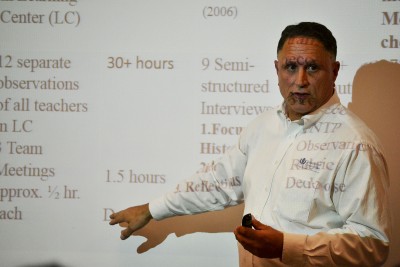
Through its Ed.D. program in educational leadership, the Neag School seeks to develop professional educational leaders with the skills they need to take an active role in leading school improvement and advance educational outcomes for children and youth – particularly in underserved areas across Connecticut.
In celebration of the Neag School’s most recent Ed.D. cohorts, the Department of Educational Leadership this past April hosted an Ed.D. Research Symposium at the Gentry Building that drew Neag School students, faculty, and staff, as well as guests from across the state. The event provided members of the 2013 cohort with the opportunity to share findings from their qualitative pilot projects, while members of the 2011 cohort were also invited to discuss their capstone research.
The Ed.D. program, which draws on four interrelated areas – policy; social justice and equity; leadership; and organizational and adult learning – requires students to complete a capstone project that involves framing their problem of practice, engaging in empirical inquiry on the topic, and developing a set of recommendations that will contribute to the field on the issue.
Those members of the 2011 cohort presenting their capstone research at the April event were Cate Carbone ’15 Ed.D., a central office administrator in Hartford Public Schools, and Mike Vose ’15 Ed.D., an assistant principal at Killingly High School. Both graduated this May.
In addition, members of the 2013 cohort shared preliminary findings from pilot project studies they had conducted this past spring semester as part of the Qualitative Methods course taught by Sarah Woulfin, assistant professor and Ed.D. program director. Each pilot project involved collecting independent data – through interviews with teachers and principals, for instance – as well as observing professional development sessions, principal work practices, and teachers’ professional learning community meetings. Students’ pilot projects addressed a wide range of topics in the field of educational leadership – from teachers’ perceptions of effective elements of professional development to university administrators’ framing of test score use in teacher preparation programs.
 Facebook
Facebook
 Twitter
Twitter
 LinkedIn
LinkedIn
